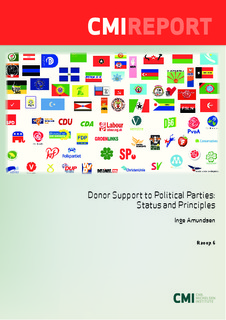| dc.description.abstract | Political parties are indispensable for the functioning of liberal democracies. However, the political parties of many transitional and developing countries are not functioning well. This fact has led to increasing donor support to political parties. However, due to the political sensitivity of the issue, donors are not supporting political parties directly. There are two indirect methods for party support. One is support for broadening democracy, assuming that this will also strengthen political parties. The other is support to parties via donor country parties and/or party-based organisations. This party-to-party support takes the form either of unilateral support from one party in donor countries to its ‘sister parties’, or of bilateral support from several parties to several parties. This paper outlines the modalities, principles and practices of donor support to political parties. | |
